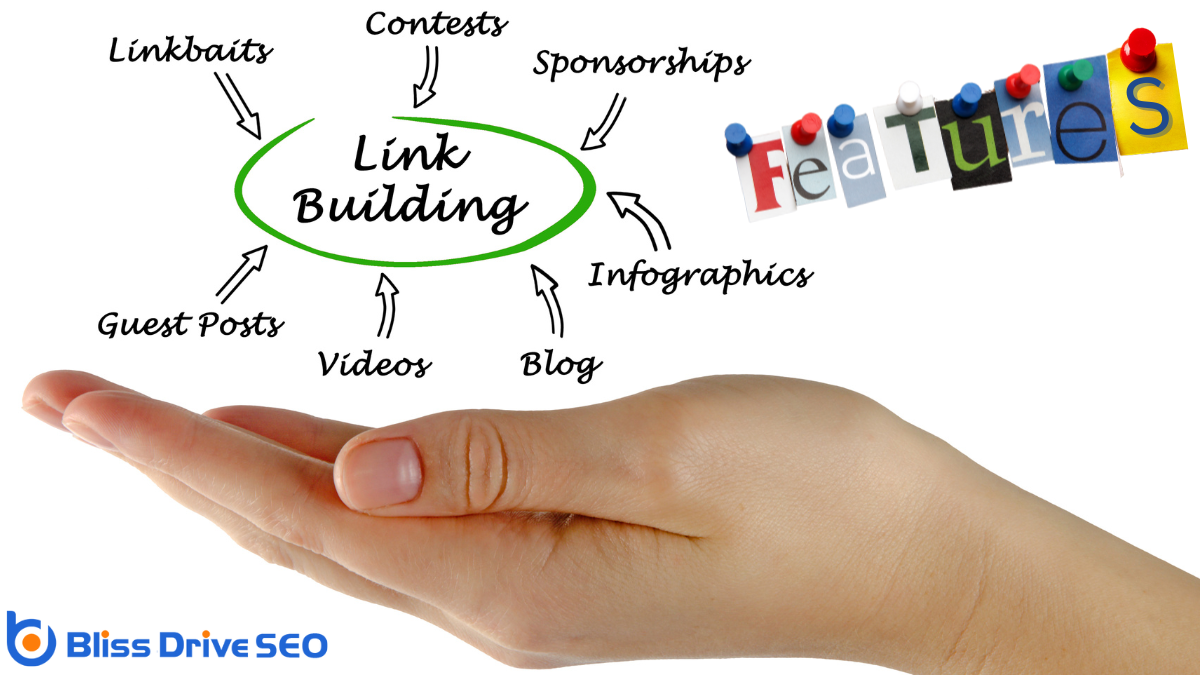Digital Marketing Services
Learn More About Us

When you start exploring link buildingThe process of acquiring backlinks from other websites., you'll notice it's not just about collecting random links; it's about strategy and precision. You have internal links that connect your own pages and external links that reach out to other sites. Yet, not every link is created equal. Dofollow links enhance your site's search engine ranking, while nofollow links don't share authority. The key lies in choosing links from credible sources to boost your site's credibility and SEO. But how do you guarantee you're not just adding links but truly enhancing your site's performance? Stick around for insights into link building's intricate details.
Understanding the different types of links is necessary for effective link building. When you're diving into this topic, it's important to grasp the nuances that differentiate each type.
First, you've got internal links, which connect the pages within your own website. They help users navigate smoothly and allow search engines to understand your site's structure.
External links, on the other hand, point from your site to another. These can enhance your content's credibility if you're linking to authoritative sources.
Then, there are inbound links or backlinks, which come from external sites pointing to yours. Backlinks are essential as they signal to search engines the trustworthiness and relevance of your site. Quality matters here; links from reputable sites hold more value.
Another type is nofollow links. While they don't pass on link equity, they're used in situations where you mightn't want to vouch for the linked content, such as in user-generated content or paid ads.
Lastly, you've got do follow links, which do pass on authority and are important for improving your site's ranking. Understanding how these link types function will empower you to build a robust strategy.

When you're building links, anchor textThe clickable text in a hyperlink, important for SEO as it provides context for the linked page. plays a pivotal role in influencing how search engines perceive your site's content. It's the clickable text in a hyperlink, and what you choose here can substantially impact your SEO efforts. Search engines use anchor text to interpret the topic of the linked page, so getting it right can enhance your visibility.
You want to aim for relevance and variety. Using relevant keywordsWords or phrases that users type into search engines to find information. within your anchor text helps search engines associate your site with those terms, improving your rankings. However, don't overdo it. Over-optimized anchor text, like repeatedly using exact matchA keyword match type where ads show only for searches that match the exact keyword or close variants... keywords, can trigger penalties. Diversity is key. Mix up your anchor text with branded, generic, and long-tail variations to keep your profile natural and authentic.
Also, consider the context. Anchor text should fit seamlessly into your content, adding value to the reader. For instance, instead of using "click here," try something like "learn about effective SEO strategies." It gives users and search engines a clear idea of what to expect.
Incorporating a strategic approach to anchor text can enhance your link-building efforts, driving more traffic and authority to your site.
Recognizing the impact of domain authority on your link-building strategy is essential for enhancing your site's credibility and search rankings. Domain authority, a metric developed by Moz, predicts how well a website will rank on search engine results pages (SERPs). It's influenced by factors like the age of your domain, the number of total links, and the quality of those links.
When you focus on acquiring backlinks from sites with high domain authority, you boost your own site's perceived trustworthiness and ranking potential.
You should prioritize building links with websites that have established credibility and high domain authority. This means targeting reputable sites within your industry or nicheA specific segment of the market targeted by affiliates to promote products or services.. Doing so not only strengthens your link profile but also signals to search engines that your site is a reliable source of information. As a result, you're more likely to see an improvement in your search rankings.
Keep in mind that domain authority isn't the only factor in link building, but it plays a significant role. By leveraging high-authority domains, you increase your chances of achieving better visibility and driving more organic trafficVisitors who come to a website through unpaid search engine results. to your site. Focus on quality relationships with authoritative sites to maximize your SEO efforts.
When building links, focus on authoritative sources rather than sheer numbers.
Prioritize content that's relevant to your audience to guarantee your links add genuine value.
Invest time in building authentic relationships with reputable sites to enhance your link-building strategy.
In the world of link-building, authority reigns supreme. When you're building links, focusing on authoritative sources can make a huge difference in your site's reputation and ranking. Think of authority as trustworthiness; search engines prioritize links from well-established sites because they see them as credible. If you want to boost your site's credibility, it's not about gathering as many links as possible—it's about getting the right ones.
You might wonder how to identify an authoritative source. Look for websites with a strong domain authority, which is a score that predicts a site's ability to rank on search engines. Sites with high domain authority usually have a significant online presence and consistently produce quality content.
Also, consider if the site is widely recognized in your industry or field.
Building links from these sources isn't just about increasing your site's visibility. It's about associating your brand with reputable names, which can enhance your site's authority in the eyes of both users and search engines. By emphasizing quality over quantity and focusing on authoritative sources, you're setting a foundation for sustainable growth and a solid online reputation.
As you delve into the world of link building, you'll quickly realize the significance of prioritizing pertinent content over sheer quantity. It's not just about gathering as many links as possible; it's about linking your content to the right audience. When your content is apt, it naturally attracts quality links, boosting your credibility and authority in your niche.
Think of it this way: a single well-placed link from a reputable source can outweigh dozens of irrelevant ones. You should concentrate on creating content that resonates with your target audience and aligns with the values and interests of the sources you're aiming to connect with. This approach guarantees the links you acquire are meaningful and contribute positively to your search engine rankings.
To truly excel in link building, focus on forging genuine relationships within your industry. Don't just seek links; aim to create authentic connections with peers, influencersIndividuals with the power to affect the purchasing decisions of others due to their authority, know..., and content creators. When you prioritize relationships over mere transactions, your network becomes a rich resource for quality backlinks. It's not just about the quantity of links; it's the quality and relevance that truly count.
Start by identifying key players in your niche. Engage with them on social media, comment on their posts, and share their content when it resonates with your audience. Genuine interaction fosters trust and opens the door to collaboration.
When you eventually reach out for a link, your request isn't just another email in their inbox; it's a conversation with a familiar face.

The backbone of effective link building is relevance, ensuring that the links you acquire are meaningful and aligned with your website's content. You need to focus on obtaining links from websites that share a thematic connection with yours. When you do this, search engines view your links as credible and valuable, which can greatly boost your site's authority and ranking.
Imagine you're running a blog about healthy recipes. A link from a reputable nutrition site makes sense, while one from an unrelated car dealership doesn't. By staying relevant, you're not just following best practices; you're creating a logical, trustworthy network that enhances your site's reputation.
To maintain relevance, analyze the content and audience of potential linking sites. Ask yourself if their content complements yours and if their audience would benefit from what you offerThe specific product or service being promoted by affiliates.. This approach not only improves your site's SEO but also enhances the user experience.
When visitors find consistent and coherent information, they're more likely to engage and return.
Genuine connections are at the heart of natural link acquisition. When you focus on building relationships with others in your industry, links to your content can come naturally. Instead of relying on artificial tactics or paying for links, aim to create high-quality content that people find valuable and worth sharing.
This means understanding your audience's needs and interests, which helps you produce content that naturally attracts attention and backlinks.
It's essential to engage actively with your audience and peers. Participate in online communities, forums, and social media platforms where your audience hangs out. Share insights, answer questions, and contribute meaningfully. When others recognize your expertise and value, they're more likely to link to your content without you even asking.
Make sure your content is easily shareable. This includes having a user-friendly website with social sharing buttons and a clear structure. When your content is accessible, people are more inclined to distribute it, increasing the chances of earning natural backlinks.
Guest posting can greatly enhance your online presence by allowing you to reach a broader audience. When you contribute to reputable sites, you not only attract new readers but also enhance your SEO authority through valuable backlinks. By strategically choosing where to post, you increase your visibility and credibility in your niche.
Expanding your audience's reach through guest posting offers an important strategy for elevating your brand presence. By sharing your expertise on someone else's platform, you tap into their established audience, introducing your brand to new potential followers. It's not just about the immediate visibility but also about building credibility.
When you write a guest post, you're fundamentally being endorsed by the host site, which can enhance your reputation in your niche.
Think of guest posting as a way to connect with like-minded communities that are already interested in your industry. If you choose the right platforms, you can reach audiences that are genuinely engaged and could become loyal followers.
It's essential, though, to provide valuable content that resonates with the audience you're targeting. This means understanding what topics they care about and addressing their needs or interests.
Moreover, guest posting allows for networking opportunities. You'll form relationships with other bloggers and influencers, which can leadA potential customer referred by an affiliate who has shown interest in the product or service but h... to future collaborations. These relationships can further expand your reach as they might share your content with their audiences, creating a ripple effect.
Fundamentally, guest posting is a strategic move to grow your audience effectively.
While guest posting introduces your brand to new audiences, it also plays a significant role in boosting your site's SEO authority. By publishing articles on reputable sites, you create valuable backlinks to your website. These backlinks act as votes of confidence, signaling to search engines that your site provides quality content. The more high-quality backlinks you have, the more likely search engines are to rank your site higher in search results.
When you write a guest post, focus on providing insightful content that aligns with the host site's audience. This increases the chance of your post being accepted and shared, resulting in more backlinks. Make sure to include a natural, relevant link back to your website in the post. This link not only drives traffic directly but also improves your site's domain authority over time.
Additionally, guest posting helps you build relationships with other bloggers and influencers in your industry. These connections can lead to further opportunities for collaboration and link-building, enhancing your SEO efforts.

To effectively evaluate the impact of your link-building efforts, monitoring and analyticsThe systematic computational analysis of data or statistics to gain insights and support decision-ma... are essential components of your strategy. You can't just build links and hope for the best; you need to track their performance. Start by using tools like Google AnalyticsA web analytics service offered by Google that tracks and reports website traffic. or specialized SEO platforms that provide insights into how your links are contributing to web trafficThe number of visitors to a website, often used as a measure of an affiliate's reach and influence. and SEO metrics. These tools help you identify which links are driving the most traffic and which ones might need improvement.
Pay attention to metrics like referral trafficVisitors who come to a website through an affiliate's promotional efforts., bounce rates, and conversionThe completion of a desired action by a referred user, such as making a purchase or filling out a fo... rates. ReferralA user who visits a merchant's website through an affiliate's link. traffic shows how many visitors are coming to your site through external links, while bounce rates indicate how engaged these visitors are. Low bounce rates usually mean your content is relevant and engaging.
Conversion rates tell you how often visitors perform desired actions, like signing up for newsletters or making purchases.
Regularly analyze these metrics to understand the effectiveness of your link-building strategy. If you're not seeing the results you want, consider adjusting your tactics. Remember, the goal is continuous improvement. By closely monitoring your analytics, you'll make informed decisions that enhance your link-building efforts and, ultimately, your site's success.
Black hat techniques might seem tempting for quick results, but they can seriously harm your website's reputation and search rankings. These methods violate search engine guidelines and can lead to penalties, including being removed from search results altogether. To maintain a solid online presence, it's pivotal to understand which practices to avoid.
Here's a list of black hat techniques to steer clear of:
In link building, focus on obtaining do-follow links from reputable sites to boost your SEO. Use relevant anchor text and prioritize quality over quantity. Always aim for natural link acquisition to maintain your site's credibility. Guest posting can be beneficial, but make sure it aligns with your content strategyA plan for creating, publishing, and managing content to meet business goals.. Regularly monitor your progress using analytics toolsSoftware used to track and analyze website performance, user behavior, and marketing efforts., and steer clear of black hat techniques to avoid penalties. By doing so, you'll enhance your site's authority and search engine performance.
